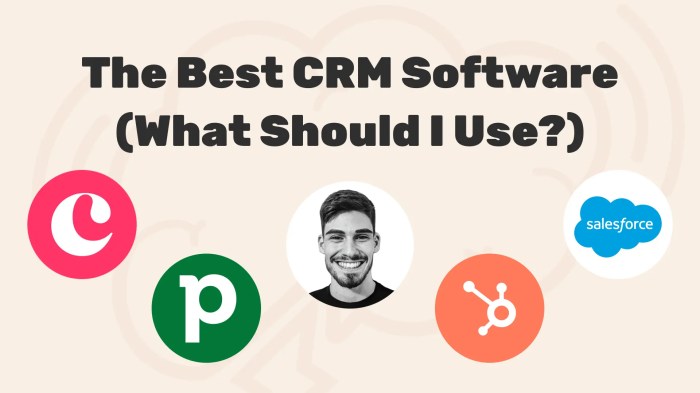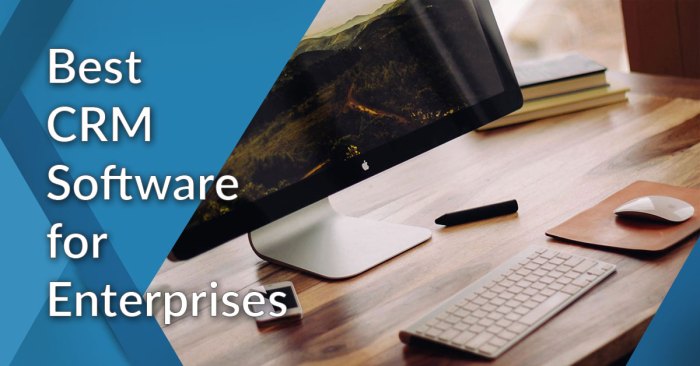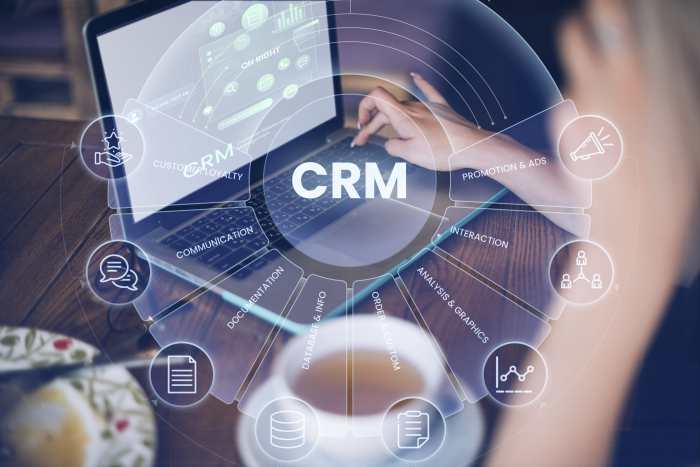Best crm software for large business – Choosing the right Customer Relationship Management (CRM) software is crucial for large businesses. A robust CRM system streamlines operations, improves customer relationships, and ultimately drives revenue growth. However, with a plethora of options available, selecting the ideal solution can feel overwhelming. This comprehensive guide will delve into the key features, considerations, and top contenders for large enterprises seeking to optimize their customer interactions.
Understanding the Needs of Large Businesses
Large businesses have unique CRM requirements compared to smaller enterprises. They typically need solutions that can handle:
- High volumes of data: Managing vast amounts of customer information, interactions, and sales data requires a scalable and efficient system.
- Complex workflows: Large organizations often have intricate sales processes, marketing campaigns, and customer service procedures that need to be integrated into the CRM.
- Multiple departments and users: Effective collaboration across sales, marketing, customer service, and other departments is essential, requiring robust access control and data sharing capabilities.
- Integration with existing systems: Seamless integration with existing ERP, marketing automation, and other business systems is vital for data consistency and efficiency.
- Advanced analytics and reporting: Large businesses require detailed insights into customer behavior, sales performance, and marketing effectiveness to make informed decisions.
- Customization and scalability: The CRM should be adaptable to the company’s specific needs and capable of scaling to accommodate future growth.
Key Features to Consider in a CRM for Large Businesses: Best Crm Software For Large Business
When evaluating CRM software, large businesses should prioritize the following features:
Data Management and Security
- Scalability: The system should be able to handle increasing volumes of data without performance degradation.
- Data security: Robust security measures, including encryption and access controls, are crucial to protect sensitive customer information. Compliance with regulations like GDPR and CCPA is paramount.
- Data integration: Seamless integration with other business systems to avoid data silos and ensure data consistency.
- Data cleansing and deduplication: Maintaining data accuracy is crucial. Look for CRMs with built-in tools for data cleansing and deduplication.
Sales Force Automation (SFA)
- Lead management: Efficient tools for capturing, qualifying, and nurturing leads.
- Opportunity management: Tracking sales opportunities from initial contact to closure.
- Sales forecasting: Accurate sales forecasting based on historical data and current trends.
- Sales reporting and analytics: Detailed reports on sales performance, individual sales representative productivity, and overall sales trends.
Marketing Automation, Best crm software for large business
- Marketing campaign management: Creating and managing targeted marketing campaigns across multiple channels.
- Email marketing: Sending personalized email campaigns and tracking open and click-through rates.
- Social media integration: Managing social media interactions and tracking social media performance.
- Marketing analytics: Measuring the effectiveness of marketing campaigns and making data-driven improvements.
Customer Service and Support
- Case management: Efficiently tracking and resolving customer issues.
- Knowledge base: Providing customers with self-service options through a comprehensive knowledge base.
- Live chat: Offering real-time customer support through live chat.
- Customer service reporting: Tracking key metrics such as resolution time, customer satisfaction, and first contact resolution.
Top CRM Software for Large Businesses
Several leading CRM platforms cater specifically to the needs of large businesses. The best choice depends on specific requirements and budget. Here are a few prominent examples:
- Salesforce: A highly customizable and scalable platform offering a wide range of features. Known for its robust capabilities and extensive app ecosystem. [Source: Salesforce Website ]
- Microsoft Dynamics 365: A comprehensive suite of business applications, including a powerful CRM solution. Integrates seamlessly with other Microsoft products. [Source: Microsoft Dynamics 365 Website ]
- Oracle Siebel: A mature and robust CRM platform often preferred by large enterprises in specific industries like telecommunications and financial services. [Source: Oracle Siebel CRM ]
- SAP CRM: A comprehensive CRM solution integrated with other SAP enterprise applications. Suitable for large organizations with complex business processes. [Source: SAP CRM Website ]
- HubSpot: While often associated with smaller businesses, HubSpot’s enterprise edition offers scalable features suitable for larger organizations, particularly those focused on inbound marketing. [Source: HubSpot CRM Website ]
Choosing the Right CRM: A Step-by-Step Approach
1. Define your business needs
Clearly identify your specific requirements and challenges.
2. Assess your budget
Determine your budget for the CRM software, including licensing fees, implementation costs, and ongoing maintenance.
3. Evaluate different CRM solutions
Research and compare different CRM platforms based on your requirements and budget. Consider requesting demos and trials.
4. Consider integration with existing systems
Ensure the CRM integrates seamlessly with your existing ERP, marketing automation, and other business systems.
5. Implement and train your team
Proper implementation and user training are essential for successful CRM adoption.

Source: website-files.com
6. Monitor and optimize
Regularly monitor the performance of your CRM and make adjustments as needed.
Frequently Asked Questions (FAQ)
- Q: What is the average cost of CRM software for large businesses? A: The cost varies significantly depending on the chosen platform, the number of users, and the required features. Expect to invest a substantial amount, ranging from thousands to hundreds of thousands of dollars annually.
- Q: How long does it take to implement a CRM system? A: Implementation time varies depending on the complexity of the system and the size of the organization. It can range from several weeks to several months.
- Q: What are the key metrics to track after implementing a CRM? A: Key metrics include sales conversion rates, customer satisfaction scores, lead generation costs, and customer lifetime value.
- Q: How can I ensure data security in my CRM system? A: Employ strong passwords, enable multi-factor authentication, regularly update software, and implement robust access controls. Ensure compliance with relevant data privacy regulations.
- Q: What is the difference between cloud-based and on-premise CRM solutions? A: Cloud-based CRMs are hosted on the vendor’s servers, offering greater scalability and accessibility. On-premise CRMs are installed on the company’s own servers, offering greater control but requiring more IT infrastructure.
Conclusion
Selecting the right CRM for a large business is a significant investment that requires careful planning and consideration. By understanding your specific needs, evaluating key features, and comparing different platforms, you can choose a solution that will optimize your customer interactions, streamline operations, and drive sustainable growth.
Call to Action
Ready to transform your customer relationships? Contact us today for a free consultation to discuss your CRM needs and explore the best solutions for your large business.

Source: financesonline.com
FAQ Guide
What are the key features to look for in a CRM for a large business?
Scalability, robust reporting and analytics, strong security features, seamless integration with other business systems, and excellent customer support are crucial.
How much does CRM software typically cost for large businesses?

Source: edgecrm.app
Pricing varies greatly depending on the features, number of users, and vendor. Expect a significant investment, often involving annual licensing fees and potential implementation costs.
What is the typical implementation timeline for a large-scale CRM deployment?
Implementation can take several months, depending on the complexity of the system, data migration requirements, and the level of customization needed.
How can we ensure data security with a CRM system?
Choose a vendor with strong security protocols, including data encryption, access controls, and regular security audits. Consider compliance with relevant data privacy regulations.
